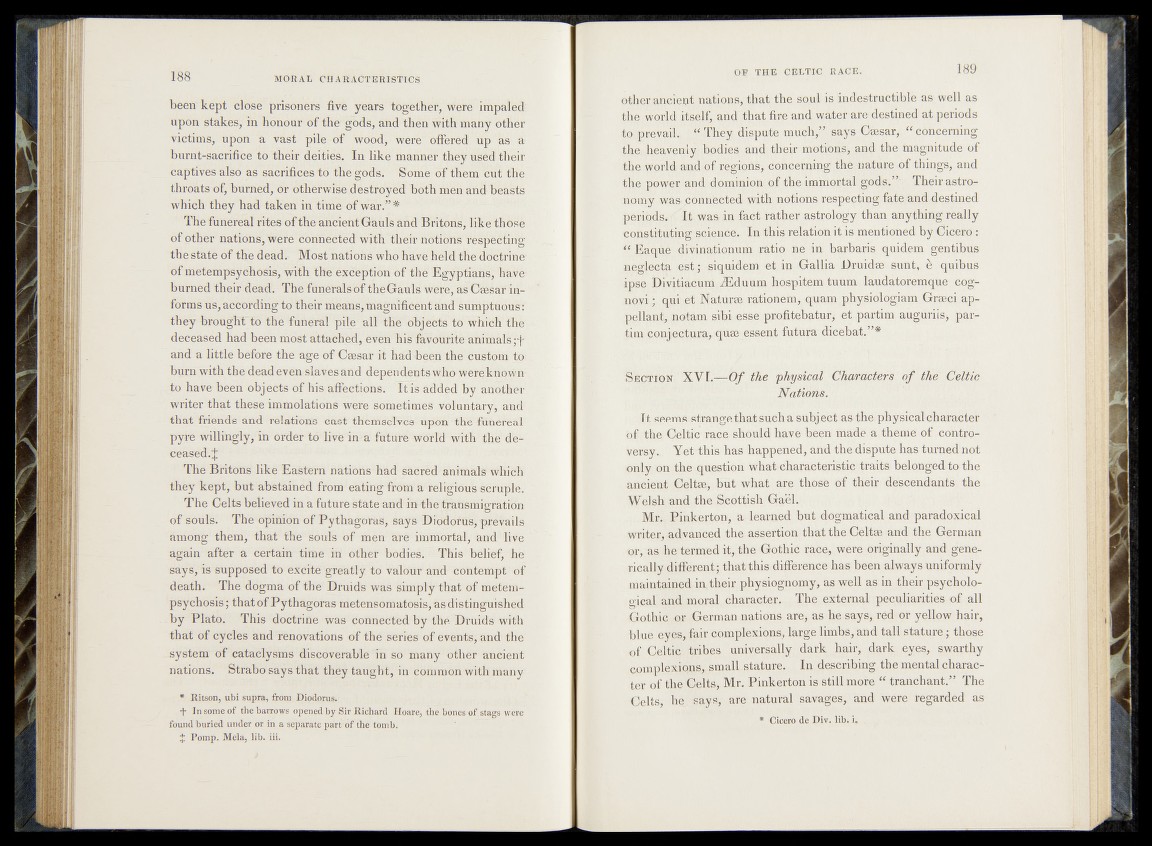
beettkept dosé prisoners five years'Logetbef, were impaled
upon stakes; in honour of the^gbas, and then with many Other
victims, upon a vast pile of wood, wèr|~ offered up as â
burnt-éacrifice to their déifiai. In like,manner they used'their
captives also aslacrifices to the godlfl Some OF them cut the
throàtsx>F, burned, Or otherwise,destroyed''both men and hhast's
which' they had taken in time of war.” *
' The funereal rites ofthe^ancient Gauls and Britons, lilc^Mbsé
of other nations, wefe connected with their notions respecting'
thVstate of the dearie Most nations who havefafeld' the doctriné
of metempsychosis, with the exception ôf thè Egy ptians, Mvé:
buïnèd their-dead. The funeraisof theGauls ^ f e ^ Cæ^ar informs
ùs, according to their means, magnificent'and1 sumptifoiisV’
thfeybroughr^- the funeral pile all Hfie“ obj ects ' to whfch' th^
deceased had been most attached, ë^^É%ïsrfàvOS'm©^^hâ,ls;‘f'
and a little before t h e r e of Çæsar it had^çen the custom, tjo!
bpffwith the dead evemslaves and depen dents whi^ferefl|fil^'
to have been objects of hi&affections. ' T ^ R d ||d by^mllPr
writer that thèse immolations were sometimes voluntàlryj and
that friends and delations cast themselves- Upon 'thb’fu^êrea'l
p ^ willingly, lia order to live in .a futiiir'e world with ttÉÉpfc
eeased.£ ;
The Britons like Eastern nations had sacrëd antmM^wllidh
mfey kept, but abstained from eating from a religions -scruple.-
The Celts believed in a future state and in the transihigïati!dn
of souls. The opinion of Pythagoras, says Diodoffis, prevails.
anidng‘ them, that the souls of men aré-immortal/arid'live
again after a certain time in other bodieêi This belief, he
says/is supposed to excite greatly to valour and contempP^of
death. The dogma of the Druids was simply that of metempsychosis
; that of P y thagoras rnetensomatosis, as distinguished
by Plato. This doctrine was connected by the Druids with
that of cycles and renovations of the series of events, and the'
.system of cataclysms discoverable in so many other ancient
nations. Strabo says that they taught, in Common with many
* Ritson, ubi supra, from Diodorus.
+ In some of the barrows opened by Sir Richard Hoare, the bones of, stags were
found buried under or in a separate part of the tomb.
other aneïept natiops, that the soul is indestructible as well as
the,world itself, and th a f fire and water are destined a t periods
tp preVmîBÆ'They dispute much/'’» says Cæsar, “ concerning
thej^heayenlyi^bodies and their motions, and the magnitude of
thetwoiîd àndl^f j^ ‘giôâs, concerning,thé,nature of things, and
the,ppwer ^and^döWtóon'of the immortal gods.” ’» Their astrofate
and destined
periods#'''"it wa%i^fa.e# VéAlperaptrology. than anything really
4’èâatituting; Jfpnpe- In this relation it is mentioned by Cicero :
d-ivinatiónum rafjo ne in, barbaris quidam gentibus
peg|Wfefte^;f^jqmde,m et in Gallia Druidæssunfc, è quibüs
ipse Divitiacum fÆd u um^(|^pi|tpm tuum laudatoremque cog-
gui; ^ ^ « iM ^ ^ a tio n em . quam physiologiam Græci appellant,^
o tâm s i ^ ^ ^ p r o f i t e b a t e ^ ;iet',partiin/ augmiis, par-
tim c.opiC^tpra, qüæ^s,ent futura dicebat.”*
feEÓTtbN ' XV l.—O / the physical Characters o f the Celtic
' Nations.
It;se'erM«trange that silttba subject,a s the physical character
bjÇvtljier Oeltie race should havé been made a theme of controv
e r s y .„ Yet-fhis has happened, and the dispute has turned not
only o n ^ e question what characteristic traits belonged to the
ancie#ÿÇeltæ, but what are tlipsè of their descendants the
W e l l a n d the..Scottish Gael.
Mr. Pinkerton, a learned but dogmatical and paradoxical
writerr advanced the* assertion that the Geltæ and the German
•or, as he termed it, the Gothic race, were originally and genetically
different; that this difference has been always uniformly
maintained inktheir physiognomy, as well as in theirpsycholo-
gic.al and moral, character. The external peculiarities o f all
Gothic, or German nations are, as he says, red ot yellow hair,
blue eÿes, fair complexions, large limbs, and tall stature ; those
of Celtic tribes universally dark hair, dark eyes, swarthy
complexiqps, small,stature. , In describing the mental charac-
tef of the Celts, Mr. Pinkerton is still more “ tranchant.” The
Celts, he says, are natural savages, and were regarded as
* Cicero de Div. lib« i. .